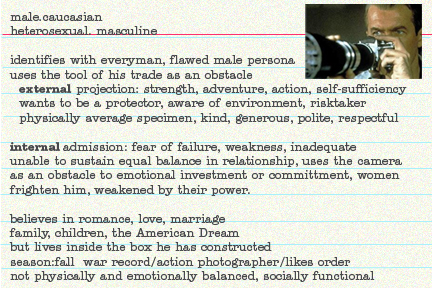



the landscape
cinematic version of the world, view of a battleground, transferring to what we read, our interpretation of the world, our guidance system. Jullien refers to position. The Western version with its nondescript space, interior and exterior, a seemingly controlled space, defined by forms, walls, familiar objects and elements that suggest something of a personality of the occupant without spilling the whole of the story, the development of the incomplete character, for the sake of mystery. What is seen, what is unseen and allowed fo become "flashing white", the space we fill in where our own cultural icons used to define or identify the characters. By definition, particularly in the present consumerist/materialist culture which is void of artifacts that translate a value for the past an present it becomes a nondescript place that has basic needs covered. And we watch each other for the clues and cues to know what to do next, begin to construct realities based on the incomplete data that we read, believing it to be truth from our own perspective. We are the watchers, the keeper of the light, the time, the space. Without knowing the community we make assumptions based on the images we read. What we see tells us what we know, but does it?

The western version having not so clearly defined positions as those included in the I-Ching, our equivalent to trigram systemization has become more homogenous or subverted as it retains of the human qualities, the ego most specifically.
Suggested definitive roles are expressly reflective of Western culture, where it becomes about persona and ego in those blended versions of strengths and weaknesses. The atmosphere, the collective space in which time exists is more clearly separated as specific role definition as presented in the studied Chinese culture. The idea of the shi is within the character in the Western version, the ego, the persona, which makes it a flawed concept at best in the attempt of the individual, the protagonist, to become larger than life, larger than the event, At the same time, the cinema has become a landscape on which we construct concepts regarding our own roles, our lives.
And we must consider how that, in effect, becomes the law of the land, the essence of community, our right, our privilege. What is it that we know? who is it that we know? How is it we gather the information? How thorough is it? How close to the event does the truth lie, and then are we equipped to pass judgement based on the information that we have? Do we have a beginning and an end? Or do we exist somehow on a continuum, interacting, intervening in the space we share with others? Who has the right to choose, and how then are the choices determined?
Community: seeking communal space, the value system of the collective, owning our own strengths and weaknesses and becoming the whole of ourselves in order to become the whole of the landscape. By giving in to ourselves, admitting that we are human, fallible, with weaknesses could become our strength. By giving in to the ego that drives us and making marks as we may be destined to do becomes the shi of the community.
But in the meantime we sit in the panopticon, staring out from the dark room through the window, the barrier of the frame, the tool, the mask that we present the public an obstacle to finding whatever truth may come of a constructed space. Is it an act of perversion to voyeuer, or is it honesty, an admission of a weakness and a need to depend on a community that we do not know, do not trust, are not a part of?
We have laws to govern what we are not able to discuss, written in language that is not the truth, inaccessible, incomprehensible, multi-layered and non-specific. We are a land of laws, no longer a land of people. Accountability is measured in distances of linear path, when the essence of where we are and how we use tools and information is hemispheric, inclusive of the dimension of time. In our fear and in our arrogance we choose to determine, to designate, the whole of a space. But then how can we protect it, defend it?
Who owns the space?
links.rear window
